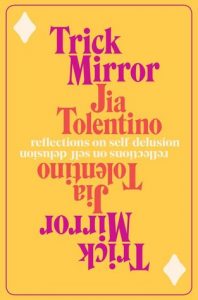So fine, if you insist. This is a witch hunt. We’re witches, and we’re hunting you. (The Witches are Coming: Introduction)
Let’s start off with this energy.*
Which is a bit of a step up from Shrill just 3 years ago. The same type of humour is there – to be perfectly honest, not the style I usually go for, but West makes many a good point – but I have to say, it’s pretty clear what’s changed in her writing (though there is also plenty that has not): West is noticeably more exasperated (perhaps because things have not improved since she wrote the essays from Shrill?); angrier, that she’s writing this at all (as she notes in her chapter on internet trolls: “I keep vowing to never write about internet trolls again, but unfortunately my country’s… ignoring the screams of the marginalized has made internet trolls not just culturally relevant or politically relevant but historically relevant. So here I am – one more troll chapter” (Leave Hell to the Devils); one hopes this is the last troll chapter West will have to write). The Witches are Coming is like Shrill’s more cynical, jaded cousin. So of course, in many ways, I loved it.
*Not quite New Year’s Eve’s Eve appropriate energy, you say? I was originally going to write about chocolate chip cookie history and recipes.
We don’t need neutrality; we don’t need “nice”. It’s not enough to just stop being terrible. We need new work that actively challenges old assumptions, that offers radical models for how to conceive of ourselves and how to treat each other… and if you care about healing the wounds of the world I hope you become a real demon bitch about diversity and never let anyone sleep. (The Witches are Coming: How to Be a Girl)
This was the first quote I highlighted and sent to friends. The Witches are Coming was published last year, but has remained relevant in this tumultuous year that is 2020 (for the quote above, think BLM and the discussion over why it’s important to be anti-racist rather than simply “not racist” (or racist, full stop) in combating systemic racism). But this is actually not my favourite chapter. That spot’s reserved for “Gear Swap”, which includes a line that I found a bit mind-blowing: “You don’t have to “hear both sides” perpetually – you can hear them once or twice, make a decision, and move on into the future” (Gear Swap). It worked for the gear swap group which story West recounts, to build a more supportive and successful platform, and as West notes, ” Twitter could [make their platforms safe, constructive]. Facebook could do this. In a more abstract way, our news media could do this…but they choose not to” (Gear Swap). There’s an entire page and a half I highlighted after the gear swap story – in the same essay – that I’d love to quote in full, but I’m going to let you read it for yourself. West is incendiary, and you may not agree with her, and maybe her strong opinions and fury or type of humour isn’t what you love to read, but in this collection of essays (especially in the later chapters as she gets more serious, or rather later in each chapter as she does so), she makes some very pointed arguments that hit right where it hurts.
In the chapter “Always Meet Your Heroes”, West tackles the question of whether we can separate the politics associated with a work: whether the author or artist can be dissociated from the work itself. Alyssia asked this earlier this year too, when J.K. Rowling’s transphobia was front and center of that discussion, and it seems like the need to ask ourselves whether watching a movie is political just never ends: have you all heard about the live action Mulan movie? I’m not going to get into it, but Vox is pretty good at breaking stuff down. There’s also this article (also Vox) on the wasted potential of the new character in Mulan, The Witch, of which I was reminded while reading one of the essays of The Witches are Coming (how appropriate, though I forget which essay it was). Instead of the movie, I’m going to recommend this picture book adaptation of the original poem off which Mulan was based: Mulan: The Legend of the Woman Warrior by Faye-Lynn Wu and Joy Ang. This small paragraph was really just an aside to show you that the essays are ever still relevant today with all that 2020’s dragged up.
 One of the things I have to admit though, reading these essays, is that in all honesty, I think The Witches are Coming is a flop. The people whose worldviews conflict with West’s, the ones with whom it would be most constructive to have a conversation, would be alienated right from the introduction. (This actually goes both – in every which – ways when it comes to many social critique essay collections, I think, not just with West’s viewpoint.) Besides which, the tone is not exactly conducive to having a conversation (I know, tone policing does not further the discussion either, which leads us to the question: how would this best be approached, then?) The Witches are Coming preaches right to the choir, and while I think West has outdone herself, especially once she turns the essays around and hones in on the issues, I find myself wondering who the target audience is. If you find yourself part of the choir, Trick Mirror by Jia Tolentino will probably be right up your alley (review of that here), and possibly Entitled by Kate Mann.
One of the things I have to admit though, reading these essays, is that in all honesty, I think The Witches are Coming is a flop. The people whose worldviews conflict with West’s, the ones with whom it would be most constructive to have a conversation, would be alienated right from the introduction. (This actually goes both – in every which – ways when it comes to many social critique essay collections, I think, not just with West’s viewpoint.) Besides which, the tone is not exactly conducive to having a conversation (I know, tone policing does not further the discussion either, which leads us to the question: how would this best be approached, then?) The Witches are Coming preaches right to the choir, and while I think West has outdone herself, especially once she turns the essays around and hones in on the issues, I find myself wondering who the target audience is. If you find yourself part of the choir, Trick Mirror by Jia Tolentino will probably be right up your alley (review of that here), and possibly Entitled by Kate Mann.
Anyway, so long, 2020! For all that I’ve had enough of you, you sure dragged out some of the ugliness in the world we can’t afford to look away from – I can only hope it doesn’t get swept under the rug again.

“You don’t have to “hear both sides” perpetually – you can hear them once or twice, make a decision, and move on into the future” is something I think the world needs to learn, especially in these days of endless Twitter discourse. Someone somewhere is always going to have a dissenting opinion. Also, I would take that a step further and say that sometimes you DON’T need to hear both sides at all, particularly in the 2020 discussions about things like systemic racism, climate change, and vaccines. Like, if one argument is providing documented proof that systemic racism exists, and someone else’s argument is “no it doesn’t”, then I think we can write that person off and move on, you know? I think I’m done being partial in these ~trying times. I have a feeling Lindy West would agree with this sentiment haha.
I know you felt icky criticizing West’s tone (since that is absolutely something people do to women), but I will say that I understand where you’re coming from. I listened to a podcast episode on which West was a guest discussing romantic comedy films (promoting her new book Shit Actually), and even that innocuous subject got me heated! I think because she speaks in such a decisive tone, it doesn’t really allow for a conversation, it’s just her ranting. She’s fun to listen to/read if you agree with her, but I imagine she would be hard to have a conversation with (does this negate what I said above, about not needing to hear everyone’s opinion? I think there’s a difference between not giving a voice to, say, the alt-right, and not allowing dissenting opinions on romantic comedies). But I’m also someone with strong opinions so who am I to judge!!!
Yes! I’m kind of embarrassed to admit how much that quote grabbed me because I think I make a point to try and listen and try to find common ground upon which we can start conversation – how else is good discussion of conflicting worldviews supposed to go? – but there was something I also came across in 2020 that echoes what you said too: when someone’s dissenting opinion is that you are not human and worthy of basic respect, 100% no one should have to be arguing that well, no, actually, your dehumanization of me, this person, or this group of people is wrong and these are reasons A, B, and C why! So on the one hand, I totally agree with that sentiment. But on the other hand, part of me still wonders if there’s just no way to reach those on the extreme ends of either side and have all parties become less polarized, because if we start to deny the possibility of conversation or even interaction – think cancel culture – with people whose worldviews conflict so much with our own, where do we draw the line? Won’t we all end up in our own insular little pods of people who only agree with us? I know that’s if we take this mindset to the extreme, and we definitely don’t need to, but it’s such a complicated web!
Haha yes, that’s it exactly! (Re: the tone) I guess it’s the same with anyone ranting, right: the first few minutes might be funny (maybe beyond that if you agree with them or it’s a particularly compelling story) but then afterwards you have to take a bit of a break before re-engaging.
I totally agree about needing to leave the possibility of conversation open! I was going to say in my earlier comment, as with most things it’s not clear where (or if) a line can be drawn somewhere. As you said, if someone believes in racial superiority, for example, I’m not going to bother listening to them, BUT that does remove the possibility of them learning anything? Probably. We’ve seen how supposedly opposite ideologies (for example, the political left and right) end up being equally militant about who is “allowed” into their space (as in your example of cancel culture, which, while not really having much effect irl, is still very frustrating).
I think what it comes down to is just sheer exhaustion. I remember in mid-2020 when BLM really took off again as a cause, a lot of activists were pointing out resources for people to educate themselves, because they could only defend themselves against ignorance so many times before calling it a day. Like, that’s too much toll on one person, but the discourse on social media is ENDLESS. It’s easy to get caught in it and to just end up being like I’VE HAD ENOUGH. Anyway. As usual there is no easy answer. I mean, there is (encouraging diverse representation and also a revamped education system in America) but the struggle is getting those in power to bend, which is why this is such a long, arduous process. But here’s to hope!